
This Harmonization with Nature Research Program is one of the eight Strategic Research Programs of the NIES, and is mainly led by the Biodiversity Division.
We conduct research and technological development on the measures for conservation of biodiversity and the sustainable use of ecosystem services, which are essential for establishing a society in harmony with nature.
- Project1:Sustainable ecosystem management strategies for a society with a declining population
- Project2:Management of ecological risk causative factors that threaten biodiversity and human society
- Project3:Biological responses, acclimations, adaptations, and resiliencies to environmental changes
- Project4:Research on problem solving using ecosystem functions
- Project5:Integrated research for balancing conservation and utilization of biodiversity and behavioral change
Through these activities, we aim to mainstream biodiversity and promote transformative change, such as behavioral change, and to improve natural capital by synergizing the conservation and sustainable use of biodiversity. We will also contribute to the Post-2020 Global Biodiversity Framework of the Convention on Biological Diversity, the next National Biodiversity Strategy and Action Plan, and the regional circular and ecological sphere from the viewpoint of sustainable use of regional resources.
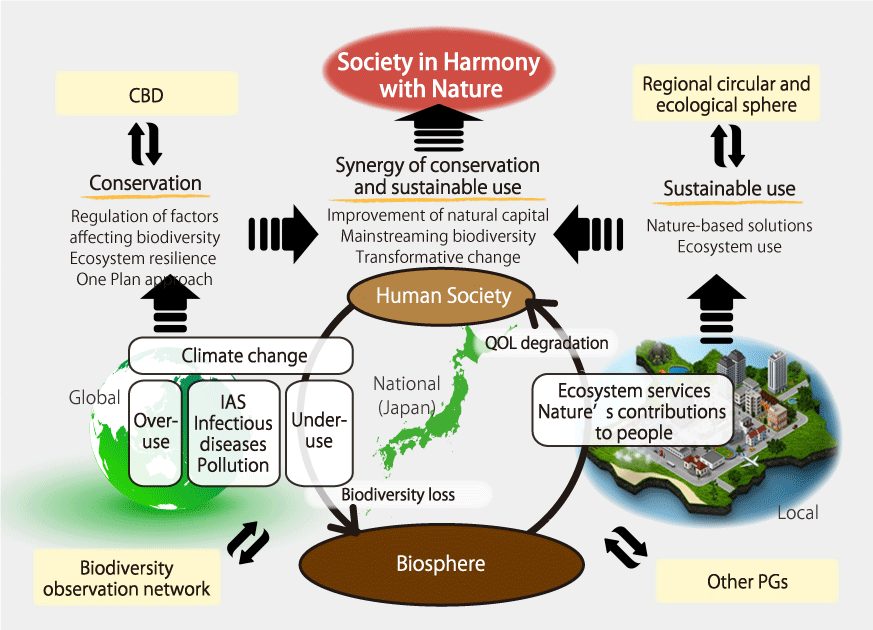
PJ1 Sustainable ecosystem management strategies for a society with
a declining population
Research Summary
As human activity areas shrink in a society with a declining population, the spatial design of ecosystem management is also being forced to be reorganized. In this project, we will focus on the boundary area between "Sato" (human living area), and "Yama" (mountains surrounding the human living area), and develop a framework for spatial decision support for biodiversity conservation and wildlife management, including tools for large-scale assessment and planning of management strategies to prevent degradation of biodiversity due to damage by overabundant wildlife and land abandonment. The results will be applied to conservation and wildlife management plans in collaboration with government agencies.
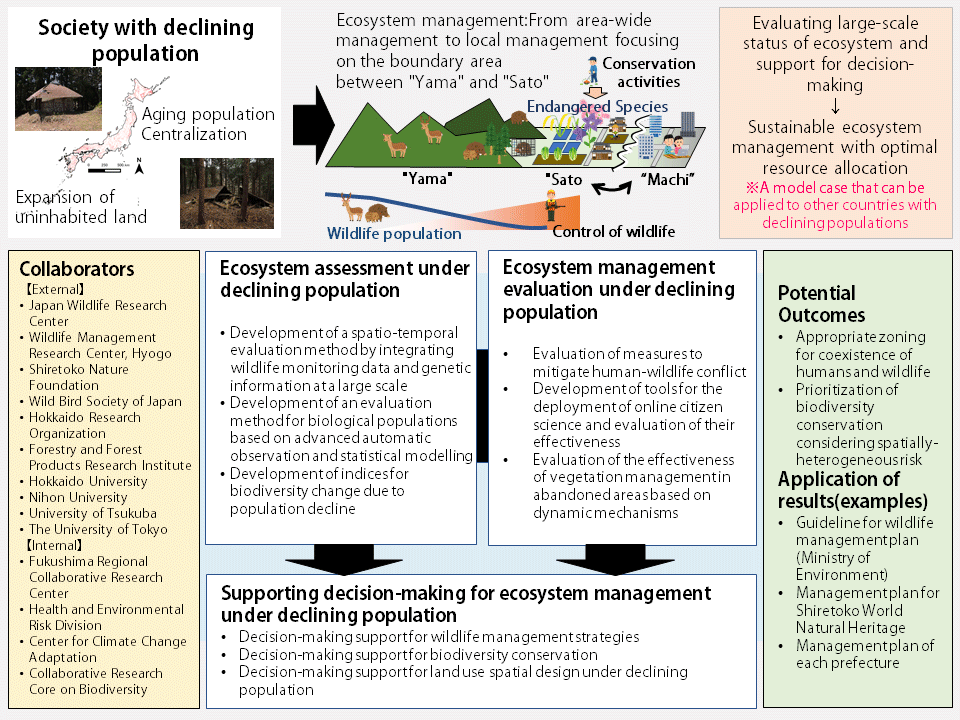
Research Objectives
In order to study the spatial design of sustainable ecosystem management in a society with a declining population, we will develop methods for assessing ecosystem changes and driving factors based on large-scale data, and evaluate the effects of ecosystem management. Based on these results, we will develop a framework to support decision-making in ecosystem management.
Research Staff
FUKASAWA Keita*, KUBO Takahiro, OGUMA Hiroyuki, FUJITA Tomohiro, YOSHIOKA Akira, TAMAOKI Masanori, YOKOMIZO Hiroyuki, OKAMOTO Ryotaro, AOKI Satoshi, MATSUBA Misako, OGAWA Yui *Principal Investigator
PJ2 Management of ecological risk causative factors that threaten biodiversity and human society
Research Summary
In this project, we will study the following environmental risk causative factors that have serious impacts on biodiversity and human society.
- Development and social implementation of early detection and control systems for invasive alien species: expansion, enhancement, and internationalization of the Invasive Alien Species Database of NIES, Japan.
- Advancement of ecological risk assessment systems for newly developed pesticides, such as neonicotinoide insecticides, and implementing them in national and international policies and laws.
- Construction of a database of wildlife diseases, risk assessment based on big data analysis, planning of measures to prevent the pandemic, and establishing a platform of wildlife diseases.
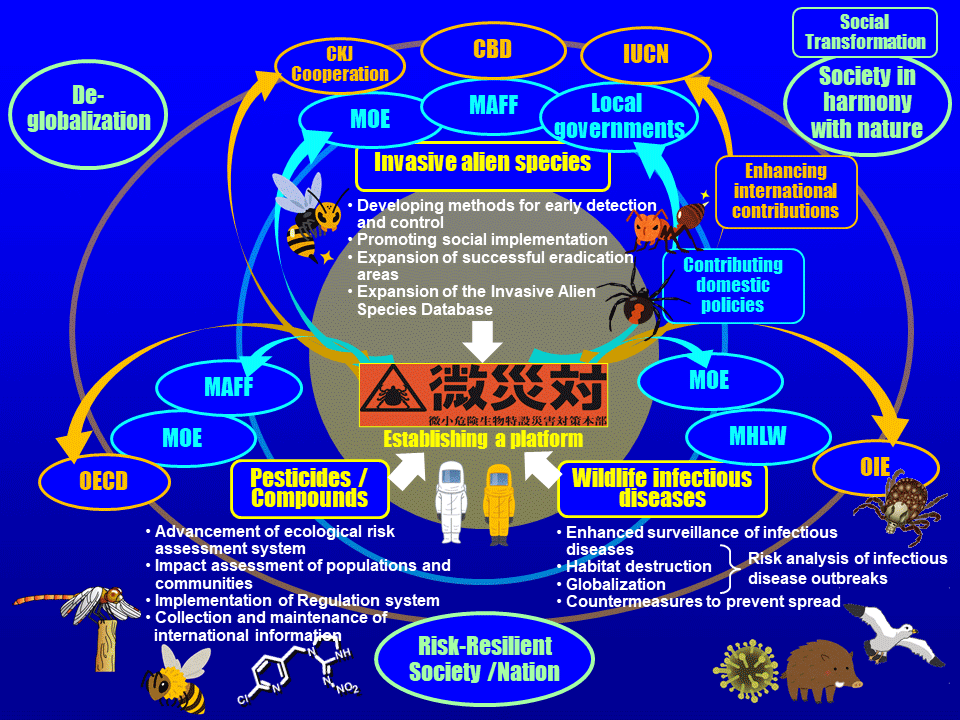
Research Objectives
By focusing on invasive alien species, synthetic compounds such as pesticides, and wildlife infectious diseases, we aim to analyze and evaluate risks, develop control methods, and implement them in policies, laws, and regulatory systems. We will also work on increasing social resilience to risk by raising awareness.
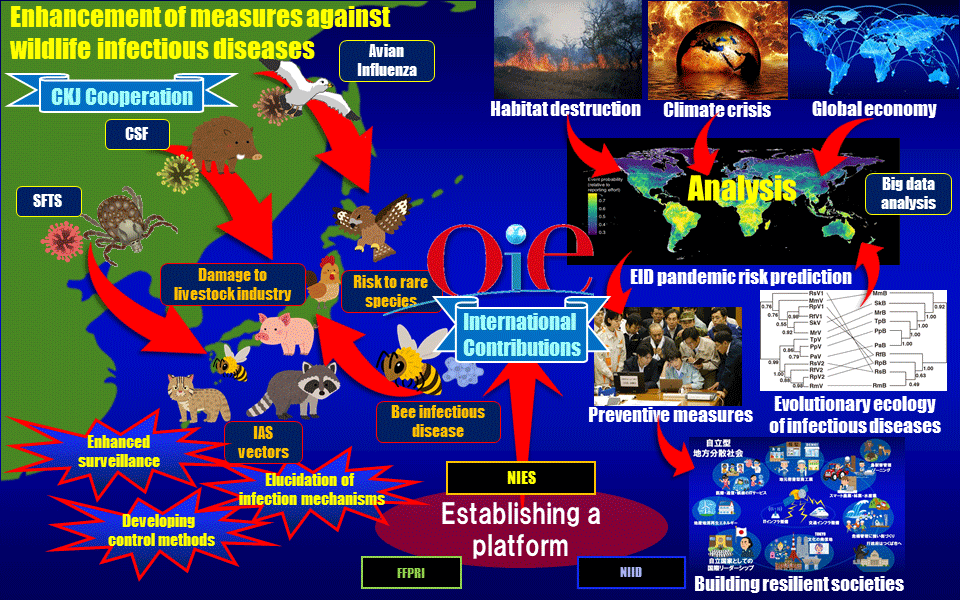
Research Staff
GOKA Koichi*, ONUMA Manabu, SAKAMOTO Yoshiko、IKEGAMI Makihiko, SAKAMOTO Hironori, NAKAJIMA Nobuyoshi *Principal Investigator
PJ3 Biological responses, acclimations, adaptations, and resiliencies to environmental changes
Research Summary
When environmental changes occur, living things respond directly to the impacts over a short time scale. If the environmental changes persist, the eco-physiological properties of living organisms will acclimate and adapt to the new environments. In the response, acclimation, and adaptation procedures, biological systems exhibit resilient behaviors such as resistance and recovery from the changes.
Through laboratory experiments, field surveys, and theoretical studies, we will evaluate the biological responses, acclimations, and adaptations to environmental changes in different scales from molecules to ecosystems. With the resultant data, we will analyze the resiliencies of biological and ecological systems to environmental changes at each spatial-temporal scale. We expect that the accumulation of knowledge in this project will be applied for predictions of ecosystem consequences in global environmental changes and for our guidelines for living in harmony with nature.
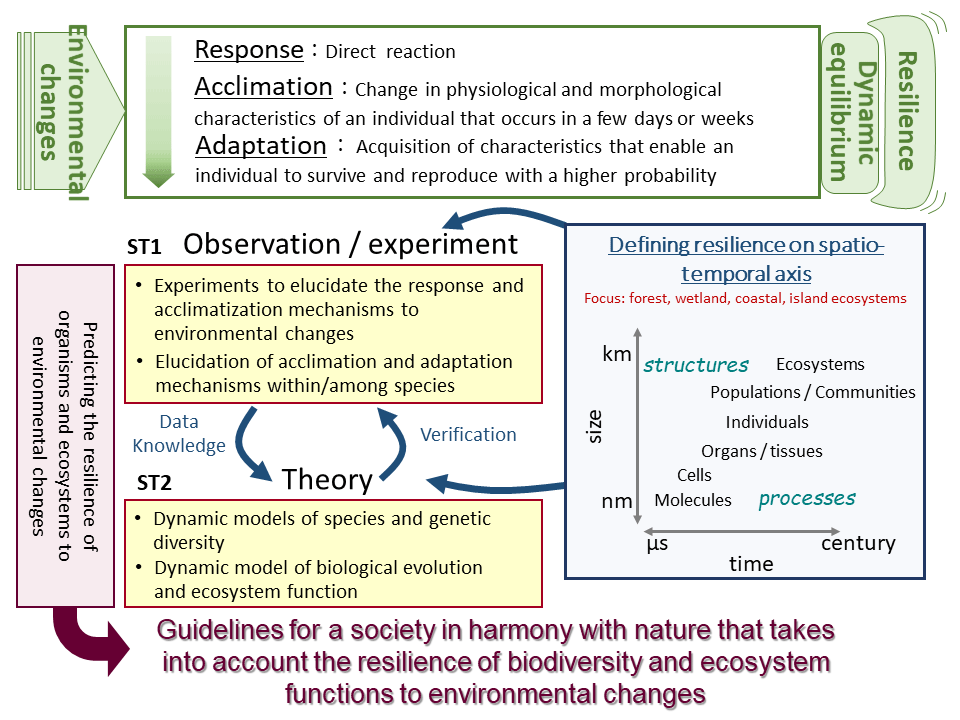
Research Staff
INOUE Tomomi*、AONO Mitsuko、AKAJI Yasuaki, ANDO Haruko, ISHIHAMA Fumiko, KADOYA Taku, TAKEUCHI Yayoi, YAMANO Hiroya, YOSHIDA Katsuhiko、ONUMA Manabu, KONDO Natsuko, UENO Ryuhei、KUMAGAI Naoki, TAMAOKI Masanori *Principal Investigator
PJ4 Research on problem solving using ecosystem functions
Research Summary
- The ecosystem functions and services of urban ecosystems provide various benefits, such as mitigation of the heat island effect, rainwater retention, and biodiversity conservation. On the other hand, direct solutions to various problems in cities and surrounding areas related to ecosystems are expected, but there is a lack of knowledge and data to support this. This project will provide scientific evidence that contributes to urban planning that efficiently utilizes the ecosystem functions and services of urban green spaces. The project will involve quantitatively analyzing and evaluating the effects on ecosystem functions and services caused by differences in spatial arrangement and management methods, especially of urban green spaces, which are major components of urban ecosystems.
- In watersheds with extensive agricultural landscapes, there is a major trade-off between agricultural production and water quality. In this sub-theme, we aim to propose management option(s) to mitigate this trade-off using ecosystem functions and processes and to generate several other co-benefits such as biodiversity conservation. We will examine and compare the effects of input control of nutrient loads (reduction of nutrient inputs through conservation agriculture, organic farming, and other methods) and output control (e.g., water purification functions through wetlands), and evaluate the potential co-benefits of each control method. In addition, through a socio-economic approach, we aim to identify the incentives of the input and output controls in terms of sustainability and livability.
- Based on the assessment of ecosystem functions and services, we will establish the basis for measures such as urban planning and watershed/regional management that utilize ecosystem functions, and promote measures that utilize ecosystems. In this sub-theme, we will share local knowledge on ecosystem functions and ecosystem services obtained from familiar seaside and waterfront areas in Japan, build a regional recycling symbiosis zone that mutually utilizes the knowledge, and use it to develop a waterfront infrastructure that can cope with future climate change. This will help deepen the understanding of natural capital in the region and ensure its sustainability.
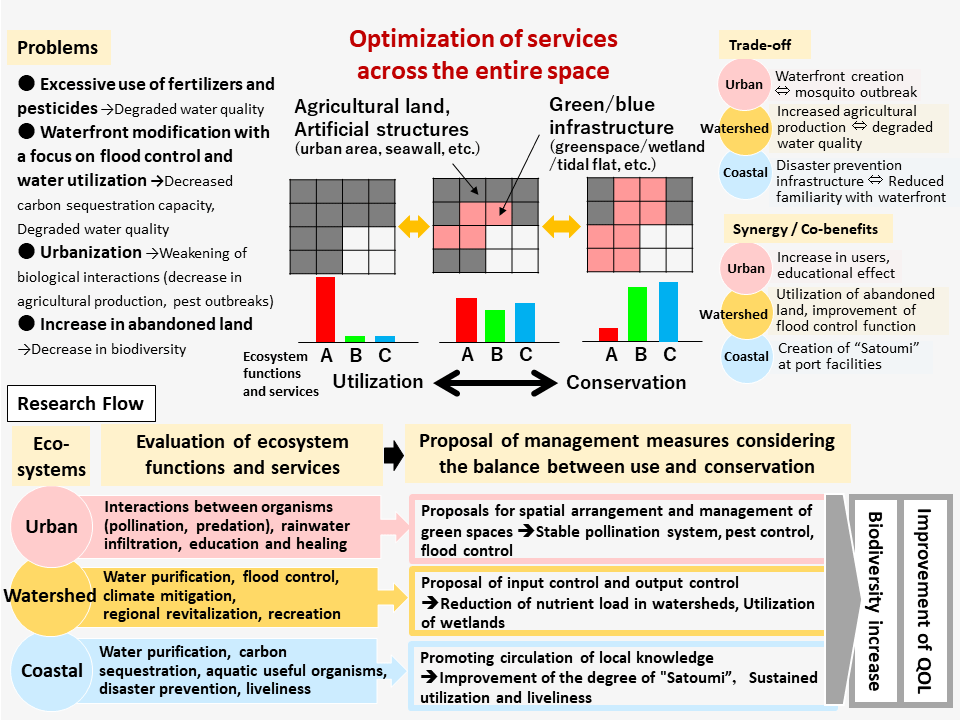
Research Objectives
Based on the evaluation of ecosystem functions and services, such as green spaces, wetlands, and tidal flats in cities, watersheds, and coastal areas, as well as their spatial arrangement and management methods, we will establish the basis for measures such as urban planning, watershed, and regional management that utilize ecosystem functions. In addition, we will study the management and systems to solve problems and implement solutions using ecosystems.
Research Staff
KONDO Natsuko*, KADOYA Taku, NISHIHIRO Jun, MATSUZAKI Shin-Ichiro, KOZU Ayato, WATANABE Mirai, YAMAGUCHI Haruyo, ANDO Haruko, FUKAYA Keiichi, OKAGAWA Azusa, YABE Tohru *Principal Investigator
PJ5 Integrated research for balancing conservation and utilization of biodiversity and behavioral change
Research Summary
This project consists of four sub-themes.
In sub-theme 1, we will prioritize protected areas and sites for implementation of measures, and plan and design highly effective measures that take into account synergies between biodiversity conservation, use of ecosystem services, and measures to address social issues such as population decline and climate change mitigation and adaptation. This research is particularly focused on in situ conservation.
In sub-theme 2, we will improve the conservation effectiveness by integrating in situ conservation and ex situ conservation, such as cell preservation, and implement the One Plan approach.
In sub-theme 3, we will evaluate the biodiversity impact of natural resource use and food production on a global scale, taking into account the supply chain.
Furthermore, research on conservation actions in sub-theme 4 will generate knowledge that will contribute to mainstreaming biodiversity and promoting conservation activities.
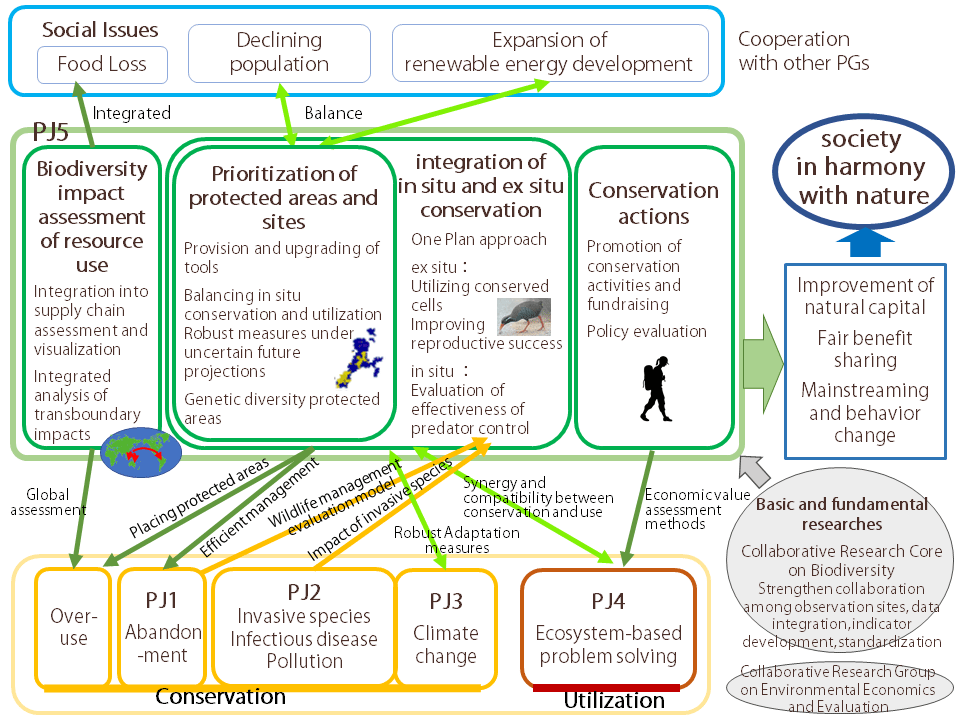
Research Objectives
We will develop measures to achieve both conservation and use of biodiversity at multiple scales (design of protected area establishment and management, integration of in situ and ex situ conservation, prioritization considering trade-offs and synergies, integration of biodiversity impacts into supply chain assessment, sustainable use of local resources, and other such measures).
We will also promote the integration of biodiversity conservation and utilization into socioeconomic activities by promoting conservation activities based on human psychology and behavior. Based on this research, we will contribute to the mainstreaming of biodiversity and transformative change, thereby improving natural capital.
Research Staff
ISHIHAMA Fumiko*, KUBO Takahiro, KADOYA Taku, TAKEUCHI Yayoi, ONUMA Manabu、KAWASHIMA Takaharu, FUKASAWA Keita, GOKA Koichi、INOUE Tomomi, KONDO Natsuko, KAWACHI Masanobu, YAMANO Hiroya, YAMAGUCHI Rintaro *Principal Investigator

